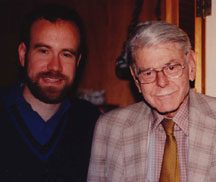Borrowing a phrase from Star Trek’s Vulcans, I would ask: Do you want to live long and prosper? If your answer is “yes,” then you’d do well to pay attention to new research on flourishing in old age.
Paula Span, in her New York Times article, “Living on Purpose,” summarizes recent research that connects long and healthy life with having a purpose for living. What counts as a purpose?
To psychologists, “purpose reflects a commitment to broader life goals that helps organize your day to day activities,” Patrick Hill, a psychologist at Carleton University in Ottawa, told me in an interview.
Though what provides purpose in one’s life varies, merely taking care of oneself probably doesn’t qualify. People with purpose “have a sense of their role in the community and the broader world,” Dr. [Patricia] Boyle said.
What does the research suggest? Here are a few choice excerpts from Span’s article:
It turns out that purpose is, on many counts, a good thing to have, long associated with satisfaction and happiness, better physical functioning, even better sleep. “It’s a very robust predictor of health and wellness in old age,” said Patricia Boyle, a neuropsychologist at the Rush Alzheimer’s Disease Center in Chicago. . . .
Following almost 1,000 people (age 80, on average) for up to seven years, Dr. Boyle’s team found that the ones with high purpose scores were 2.4 times more likely to remain free of Alzheimer’s than those with low scores; they were also less likely to develop mild cognitive impairment, often a precursor. . . .
Purposeful people were less likely to develop disabilities. And they were less likely to die: a sample of 1,238 people followed for up to five years (average age: 78) by Rush researchers found that those with high purpose had roughly half the mortality rate of those with low purpose. . . .
I’m reminded of the classic book by Dr. Viktor Frankl, Man’s Search for Meaning. A survivor of the Auschwitz concentration camp, Frankl argued in his book that those who had some transcendent purpose in life were better able to endure the horrors of incarceration. They lived longer and thrived even in the most difficult of circumstances.

I’m also reminded of my grandfather, who “retired” in his late sixties after a long career as a civil engineer. Yet retirement opened up many opportunities for him to use his talents for charitable work. For at least a dozen years following his official retirement, he continued doing engineering work for his church, the local YWCA, a seminary, and many other non-profit organizations. This work energized my grandfather and gave him a sense of meaning. I expect it did contribute to his living well beyond the norm.
Span’s article on purposeful aging does not suggest how someone might get a sense of purpose, other than mentoring younger people. But, I would expect that most senior citizen mentors are mentoring others because they have purpose, not in order to find some. In my experience, the most fulfilled and vibrant elders have a deep, lifelong purpose for their lives, one that transcends temporal idols such as individual success or financial achievement. When people, young and old, see their lives in light of their “high calling” to know and serve God in every part of life, they are prepared to live long and prosper.










